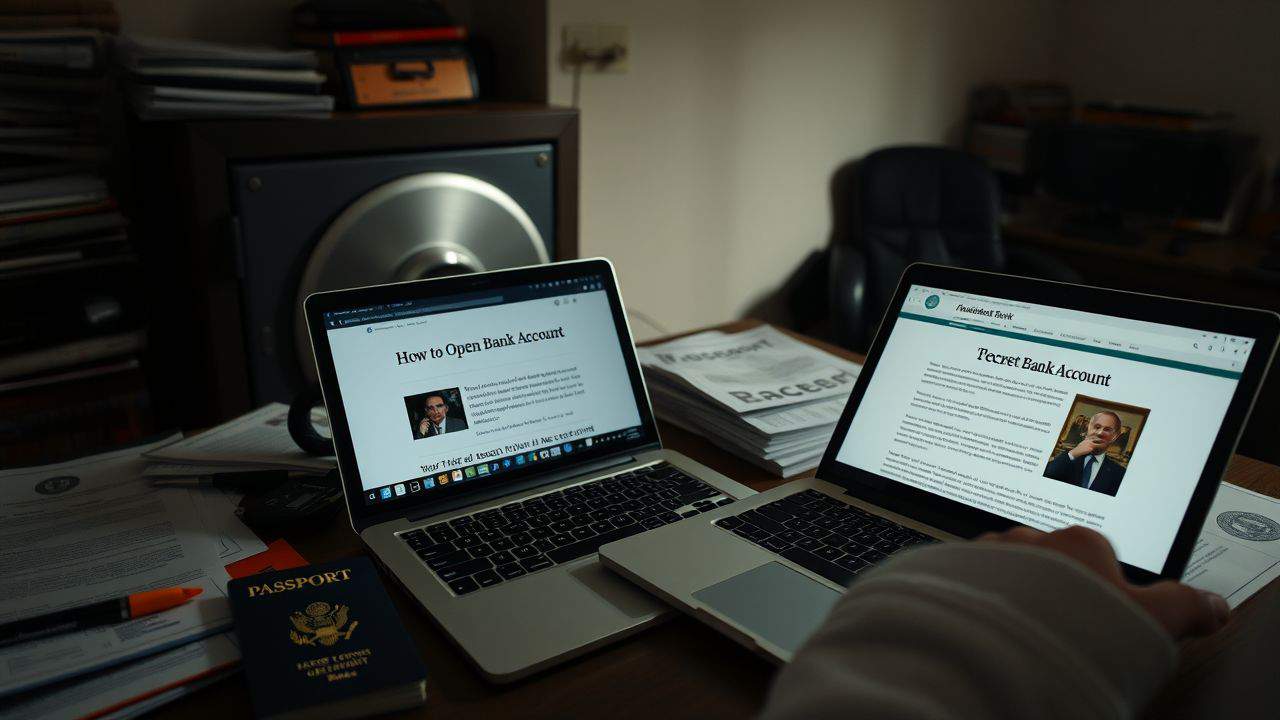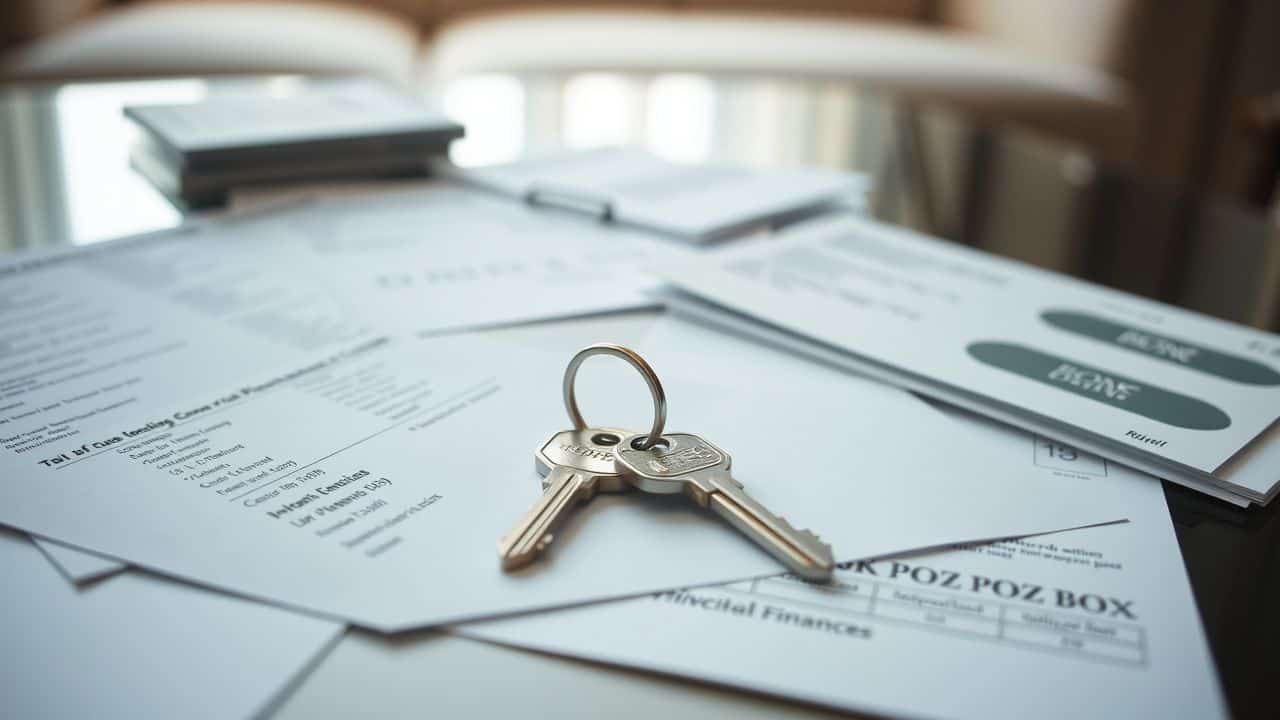Money matters can feel tricky when you need to keep some cash private. A secret bank account offers a safe way to manage your money away from prying eyes. I’ll show you how to open a secret bank account with simple steps that protect your privacy.
Ready to take control of your private finances? Let’s begin.
Key Takeaways
A secret bank account needs proper ID proof, a private P.O. box ($100/6 months), and a separate email to maintain privacy. Many folks pick offshore banks in Luxembourg, Monaco, or Singapore for strict privacy rules.
Online banks offer better privacy and lower fees than traditional banks. They often give higher interest rates on savings. Virtual banks let you manage money from anywhere without visiting branches.
Keep your secret account safe by using a private browser, avoiding shared devices, and checking daily for odd charges. Smart moves include getting a separate phone for banking and never using public Wi-Fi.
Crypto payments and prepaid debit cards help hide money moves. The blockchain system uses special codes instead of names. Most private banks ask for basic ID but won’t dig deep into money sources.
Never mix shared expenses with your secret account. This can cause trust issues in relationships, as shown in the Ric and Marta Shahin case. Keep personal savings strictly separate from joint finances.
Table of Contents
Reasons for Opening a Secret Bank Account
Life throws curveballs that need quick money moves away from prying eyes. A private bank account gives you the power to dodge identity theft and keep your money safe from lawsuits, while letting you build your own financial path without anyone looking over your shoulder.
Financial independence

A secret bank account gives you total control of your money. So, what documents do I need to open a bank account? It’s an important question to address before getting started.
Online banks offer better privacy than traditional banks for managing your cash. Your private account lets you build savings without anyone knowing about it. Many folks use P.O. boxes to keep their banking mail away from prying eyes.
Smart money moves start with having your own secure account. You can fund it through wire transfers or direct deposits from your paycheck. The right to privacy matters when dealing with personal finances.
Online payments and mobile banking make it easy to track your spending privately. Your secret account helps you break free from financial control by others while building your own nest egg.
Privacy and security

Privacy stands as a top reason for setting up hidden bank accounts. Many folks pick offshore financial centers like Luxembourg, Monaco, or Singapore for their strict banking rules.
These places use special codes instead of names to hide account owners’ details. Your money stays safe through numbered bank accounts, which limit access to only high-ranking bank staff.
Smart banking means keeping your financial moves quiet and your assets protected.
Money talks, but privacy whispers.
Digital safety needs extra care in today’s connected world. Your browser history, internet connection, and e-mail can leak info about your banking habits. Use strong passwords and avoid shared devices when checking your account.
Pick banks that offer secure payment methods like Google Pay or Apple Pay. Smart moves include getting a P.O. box for bank mail and using crypto wallets for added privacy. The bank transfer system in places like Switzerland gives you both safety and secrecy, though they must follow strict rules about sharing tax info.
Preparing for a surprise or gift

Secret bank accounts make perfect sense for planning special surprises. Many spouses love to save up for milestone gifts like anniversary presents or dream vacations without spoiling the element of surprise.
A private account lets you stash away money gradually through small deposits that won’t raise eyebrows on shared statements. You can link your debit card to this account and make purchases without leaving traces on joint credit cards.
Money transfers to a separate account help you budget for meaningful gifts without stress. The cash app works great for moving funds discreetly between accounts. Gift cards offer another smart way to build up your surprise fund slowly.
Just pick a bank that focuses on privacy and keeps your financial moves under wraps. This approach stays fully legal while letting you create magical moments for your loved ones.
Steps to Open a Secret Bank Account

Opening a secret bank account takes smart moves and careful planning. You’ll need to pick the right bank, gather your papers, and set up private ways to get your mail – but I’ll show you the exact steps to make it happen without stress.
Research banks with privacy-focused policies

Banks in places like the Isle of Man offer strong privacy rules for your money. I picked these spots after looking at their strict banking laws and low tax rates of 15% on outside income.
Many banks there keep your info private through special trust accounts and tight security steps.
Your best bet starts with smaller private banks that focus on keeping things quiet. Look for banks that don’t share your data with other companies or sell it to outside groups. Smart bankers use P.O. boxes and virtual payment systems to stay off the radar. Most private banks ask for basic ID proof but won’t dig too deep into your money sources. Just make sure you follow the rules about reporting your accounts to stay legal.
Choose between online or traditional banks
After finding a privacy-focused bank, you’ll need to pick between digital and brick-and-mortar options. Online banks shine with lower fees since they don’t pay for physical buildings and staff.
I switched to an online bank last year and saved $240 in annual fees alone. Plus, these digital options often give better interest rates on savings accounts.
Traditional banks still hold their ground with face-to-face service and more banking products. You can walk in, talk to a real person, and handle complex transactions right there. Some folks prefer this personal touch for their asset protection needs.
The smart play might be using both – an online bank for daily stuff and a traditional bank for special services. This hybrid approach lets you grab the best of both worlds: low fees from online banking and full-service options from local branches.
Just keep your private account separate from shared devices or emails to maintain secrecy.
Verify identification requirements

Banks need proof that you are who you say you are. I learned this firsthand while setting up my online banking account last month.
You’ll need to show your driver’s license or passport, plus proof of where you live. The bank must follow strict rules about knowing their customers to stop money crimes. These rules help protect against fraud and keep your money safe.
Trust is good, but verification is better in banking.
Your bank will check if your documents are real and match their records. They’ll look at your adjusted gross income and ask about where your money comes from. Some banks might want extra proof if you’re opening an account with lots of cash.
I suggest bringing more ID than you think you’ll need. This saves you from making extra trips to the bank. Most banks accept utility bills or tax documents as proof of address.
Use a P.O. Box for correspondence

A P.O. Box offers a smart way to keep your banking info private. I got mine at the u.s. postal service for about $100 per six-month term. This separate mailing address stops bank statements from showing up in your home mailbox.
Your spouse or roommates won’t see any paper trails from your secret account.
Setting up your P.O. Box takes just 30 minutes. You’ll need to bring two forms of ID and fill out a quick form. The box comes with its own key, and you can check it whenever you want.
This extra layer of privacy helps protect your financial knowledge from prying eyes. Let’s explore how to pick the right online or traditional bank for your secret account.
Avoid linking the account to shared devices or emails

Keep your banking details off shared devices like family computers or tablets. I learned this the hard way after my ex spotted my secret account on our shared iPad. Your private bank account needs its own email address – one that no one else can access.
Set up a fresh email just for banking notices and statements. This keeps nosy people from stumbling across your financial info.
Smart phones pose a big risk for privacy. Never save your bank login details on phones that others might use. Banking apps can store your info without asking, so check your settings often.
I suggest using Capital One’s privacy mode or similar bank features that clear your data after each session. Your secret account should stay secret, so take these steps to protect it from prying eyes.
Managing Your Secret Bank Account

Managing your secret bank account needs smart moves to keep your money safe. You’ll need to check your transactions daily through a private browser and pick payment methods that won’t leave a trail, like prepaid cards or cryptocurrencies.
Use online and mobile banking securely
Safe banking starts with smart app choices. Download your banking apps only from official stores like Google Play for Android-based phones. Set up multi-factor authentication right away to block sneaky hackers from skimming your data.
Strong passwords make a huge difference – mix up letters, numbers, and symbols to create tough codes that others can’t crack.
Your banking habits matter just as much as your security tools. Stay away from public Wi-Fi networks while checking your account balance or making card payments. Pick quiet, private spots to handle your money moves.
A password manager can keep your login details safe and make them easy to use. These simple steps help protect your cash from digital thieves who love to target banking apps.
Avoid using the account for shared expenses
Keep your secret account strictly for personal use. Mixing shared bills or joint expenses creates a mess of problems, as seen in the case of Ric and Marta Shahin. Your private account needs clear boundaries to avoid trust issues in marriage.
The tax bracket and deductions from joint finances should stay separate from your hidden funds.
Financial transparency builds trust; secrecy breeds suspicion.
Your secret account works best for personal savings or private investments in stock. I learned this the hard way after mixing personal and shared expenses led to heated arguments with my spouse.
The offshore bank route might seem tempting, but using local banks with clear separation proves smarter. Let’s explore how to monitor your transactions safely in the next section.
Regularly monitor transactions
Tracking your secret account needs daily attention. I check my private transactions each morning while having coffee. This habit helps me spot any odd charges right away. Banks watch for strange activity, but you must stay alert too.
Your private money needs your eyes on it.
Mobile banking apps make daily checks simple and quick. I use a separate phone just for my numbered account. This extra step adds more privacy to my banking. I never log in on shared devices or public Wi-Fi.
Smart tracking means safe money. A quick five-minute scan of your recent charges can save you from big headaches later.
Additional Tips for Privacy

Want to take your banking privacy up a notch? Check out virtual bank accounts and anonymous payment options in our full guide! 👉
Consider virtual bank accounts
Virtual banks give you total privacy without the hassle of visiting physical branches. These banks run their operations online, making it easy to manage your money from anywhere. I opened my first virtual account last year and loved the higher interest rates compared to regular banks.
The lower fees helped me save more cash each month.
Digital banking comes with smart tools for tracking your spending and paying bills on time. You’ll get instant alerts about your transactions through your phone. Most virtual banks offer prepaid debit cards that work just like regular bank cards.
The best part? You can set up automatic bill payments and never worry about late fees again. Virtual accounts also make it harder for others to track your ownership of funds.
Explore anonymous payment methods (e.g., cryptocurrencies)
Cryptocurrencies offer a smart path to keep your money moves private. The blockchain system lets you send and receive funds without showing your real name. Many guys practice stealth wealth through crypto payments.
Your transactions stay hidden from prying eyes, though total privacy isn’t guaranteed.
Digital coins give you more control over your financial footprint. You’ll need a digital wallet to store your crypto assets safely. The system works through special codes instead of bank account numbers.
This setup helps protect your personal info during money transfers. Most crypto platforms need basic ID checks, but they don’t share your details with others. Your payment history stays between you and the blockchain.
People Also Ask
Is opening a secret bank account legal?
Opening private accounts is legal when done right. But using them for fraudulent conveyance or dodging child support is against the law. Watch out for defrauding others – courts have clear precedents against it.
What is the best way to start anonymous banking?
The safest path is through an asset protection trust. These trusts help keep your money safe while following the rules. You’ll need to name an ultimate beneficial owner, but your privacy stays intact.
Can I open a bank account in Switzerland for privacy?
Yes, Swiss banks still offer private accounts. They’ll give you a checkbook and basic banking tools. But remember, Swiss banks now share some info with other countries to stop bad behavior like infidelity-related hiding of assets.
How do bank affiliate programs work with private accounts?
Bank affiliate programs can help you find the right private account. They connect you with banks that match your needs. But be careful – some programs might not protect your privacy as much as they claim.
References
https://www.mybanktracker.com/savings/faq/secret-bank-account-294176
https://fairygodboss.com/career-topics/5-reasons-you-want-to-keep-a-secret-bank-account-from-your-partner (2019-03-11)
https://payio.co/anonymous-bank-accounts/ (2023-03-31)
https://www.oprah.com/money/opening-a-secret-bank-account-etiquette-advice
https://forums.moneysavingexpert.com/discussion/2255013/secret-bank-account
https://www.synchrony.com/blog/banking/online-vs-traditional-banks (2024-05-23)
https://www.idenfy.com/blog/bank-account-verification-guide/ (2024-10-29)
https://finance.yahoo.com/personal-finance/banking/article/open-bank-account-no-physical-address-193629321.html (2024-10-14)
https://www.mybanktracker.com/blog/find-my-answers/open-bank-account-without-parents-294645
https://www.nytimes.com/2024/06/23/business/financial-secrets-money-partner.html (2024-06-23)
https://capitalixe.com/blog/how-to-open-a-virtual-bank-account-a-complete-guide/ (2024-08-23)
https://hoody.com/privacy-hub/a-guide-to-making-anonymous-payments-online

